
Which are the new elements in the relationship between Moldova and the EU and why did they appear in 2017? Why did things in these relations go better at economic level than at political one? Did the Republic of Moldova respect the recommendations of the Venice Commission or not? What is the main test for the reforms related to the fight against corruption and improvement of justice? What is the relationship within the pro-EU government – the EU - pro-EU opposition “triangle”? How free is the press in Moldova and how firm is the EU’s position? Answers to these and other questions can be found in an interview conducted by Valeriu Vasilica with His Excellence EU Ambassador to Moldova Peter Michalko.
***
- Mister Ambassador, 2017 was a relevant year for what is now the Republic of Moldova as a state as it was a non-electoral year and was somewhat stable, without pronounced political, economic and social crises that would have significantly influenced things at domestic level. Can we also define the country’s external relations, especially with the main and strategic partner – the European Union?
- We can definitely say that last year was important for the relations between the European Union and the Republic of Moldova. It was a complete year of implementation of the Association Agreement and the Free Trade Agreement. So, on the one hand, it was a year when the relations were strengthened and the Republic of Moldova was actively supported by the European Union and a year when we had a very open and sincere dialogue and when new elements for our relations started to be used. I refer to the political conditions for providing macro-financial assistance, related to the political processes or, more precisely, to the adoption of the new electoral system after the recommendations of the Venice Commission and the OSCE were ignored. In general, our cooperation continued. Trade grew and investments continued to be made in the Republic of Moldova, even if not at the pace we wanted. That’s why we hope it was a year when we started to fully use the capacities provided by the Association Agreement with its important component – Free Trade Agreement.
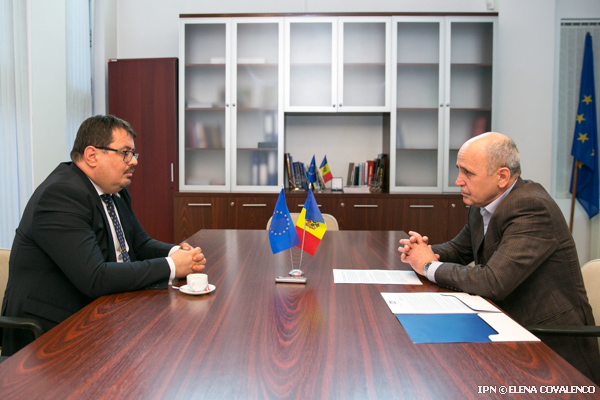
“Particularly” integration and “only” association
- Indeed, the Moldova-EU relations have two main components that are stipulated in the Association Agreement: economic integration and political association. If I understand correctly, in 2017 things at economic level went better than at political one. Why such a paradox? Paradox because much more is asked from the economic sector - “particularly” integration - than from the political one - “only” association?
- This agreement is a typical one and refers not only to the Republic of Moldova, but also to other countries of the Eastern Partnership and, in a broader meaning, for example, to the countries of Southeastern Europe. The economic integration opens up to the Republic of Moldova access to the largest market of the world, if we consider the power of the market - 500 million consumers in the European Union with big purchasing power – on condition that the same level of standards is ensured. This applies to the quality of production, which is also the general principle of access to the EU market.
Instead, the Republic of Moldova has access to EU assistance for meeting these standards, which is important not only for exporting to the European Union, but also to everywhere in the world. At the same time, such a relationship, based on economic integration, is the best vising card or, if you want, invitation to investors, which can be sure they will have access to the European market if they start a business in Moldova.
As regards the association relationship, this is a phase typical for countries that go through transition, transformation and reforms that have not only an economic dimension, but also ensure the proper transformation of society. This relationship is based on the common values mentioned in the preamble to the Association Agreement. Consequently, the “paradox” to which you refer can be explained by the fact that a number of objective factors are involved in the economic integration processes, in the form of standards, for example, while the other areas linked to the transformation of society are related mainly to subjective factors that are, for example, political in nature, connected to mentality, traditions, professional training, etc.
- What score could be given to the economic part of the Association Agreement last year, on a scale of 0 to 10, for example?
- It is yet too early to give exact grades as we do not have the final results of trade for the whole year, but I think we can say with certitude that it is a trajectory of significant growth given that two thirds of Moldova’s total exports go to the European market. I think this is a proof of the EU’s openness about which I spoke. The industrial products represent 70% of these exports and this fact has two positive aspects. The first is that there is big potential in the agrifood sector, while the second is the evidence of the big potential of attracting investments for industrial production with high value added. This means jobs and good salaries for Moldovans.
- How did things go on the “more subjective” part of the Moldova-EU relations, for example, in implementing the European principles of the rule of law and good governance in 2017, compared with the previous years or compared with the expectations of the EU?
- I think we can say that the efforts to promote and implement reforms in the areas related to the Association Agreement, including the key ones, such as the respect for the democratic system, human rights and fundamental freedoms, continued. But I already said that, within our honest and open dialogue, which should be between friends, we had to also take such measures as the stopping of budget support in the justice sector for the previous years, owing to the lack of reforms on which we agreed earlier, but which, regrettably, didn’t take place. In general, we saw efforts, but a lot is yet to be done to ensure reforms in a number of areas.
Our dialogue continued in a structured way, including within the Association Council, the Association Committee, the Parliamentary Association Committee and within the third, very important pillar of the dialogue - the Civil Society Platform.
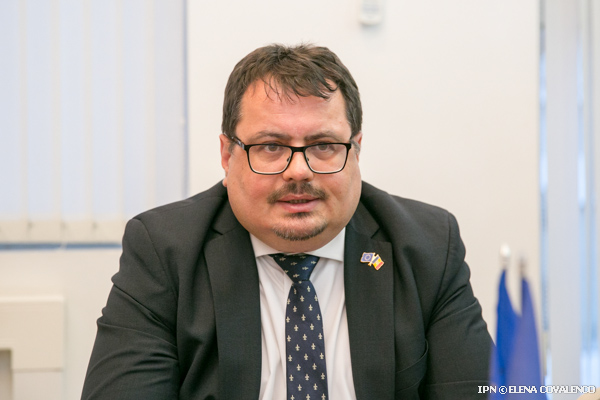
“Recommendations of Venice Commission haven’t been respected...”
- You already mentioned the EU’s dissatisfaction with the way in which Moldova took into account the recommendations of the Venice Commission in 2017. A delegation of the Commission visited Moldova again and a conclusion I think wil be formulated later. Does the EU maintain particular UE leverage in the dialogue with the Moldovan government for things in our society not to derail on this segment?
- The European Union’s position on the amendment of the Election Code last year hasn’t changed. In our opinion, the recommendations of the Venice Commission haven’t been respected. Maybe some of them were, but definitely not to the extent to which we could say that they were properly respected, and this led to the common position of three institutions of the European Union: the Council, the Commission and the Parliament, which introduced this political precondition in our assistance. The given position was later included in one of the paragraphs of the Memorandum of understanding on macro-financial assistance, which says that the assistance depends on the observance of the democratic standards, principles, the political multiparty mechanism and human rights, with specific emphasis on the implementation of the electoral legislation. This is also a way of noting the importance attached by the EU to the values on which our relationship is based and which is for us a key element in our relationship.
- Reforms to fight corruption and improve justice were a kind of “Achilles’ heel” for all the pro-European governments of the Republic of Moldova. Which were the trends in this regard in 2107 and what do these tendencies reveal?
- In 2017 too, we expected to see the progress made in fighting corruption. This continuous effort is important as corruption is the source of a number of negative phenomena and it is against the just character of society. For its part, the just character of society and the equality of people before the law are among the biggest problems of Moldovans and of those who would like to invest, but cannot for these causes.
During the past year, a lot has been done to build and support the anticorruption institutions. We now speak about their efficiency and functioning in the proper way as corruption should be rooted out at all levels, not only at the lowest ones. Will is needed in this regard, including political one, and the way in which the banking fraud committed in Moldova is now investigated is, I think, the main test and we expect that those who are to blame will be held accountable and the resources that can be yet found will be recovered.
The restoration of trust in the financial-banking and economic sectors of the Republic of Moldova is another important thing in a broader meaning. A state should be able to efficiently investigate corruption and should build a society where this is not welcomed and should be rooted out. The idea is also stated in the European Commission’s report of December 2017 on the fulfillment of the plan of action in the area of visa liberalization, which says it clearly that immediate steps should be taken to fight corruption and other steps should be taken to fight money laundering. And this is one of the conditions imposed by the EU for providing macro-financial assistance. So, the whole system of reforms is related to these steps, but the final goal is to eliminate corruption from society.
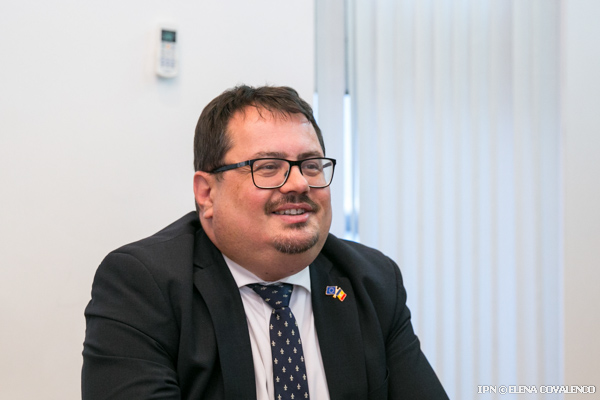
Trilateral communication
- The assessments of the Moldovan government’s activity were more reserved until now. Where there in 2107 areas where the government ensured only good or mainly good effects in the complex process of reformation of Moldovan society envisioned by the Association Agreement?
- I think the most important thing is to say that tendencies to do reforms should permanently exist. We see positive things in the economic sphere. We see highly appreciated steps in stabilizing the banking sphere. This was the most important thing done after the banking fraud was committed. Confidence was restored on this segment, including by adopting the legislation envisioned by the Association Agenda, this being another condition for macro-financial assistance. In general, we can say that more progress is witnessed when we speak about the adoption of legislation, but we must yet see more implementation.
- Where do you think is the truth amid the positive assessments that are given regularly by the government in the process of doing reforms and amid the harsh criticism of the opposition that often uses the notion of “state capture”?
- I think it is normal to see different opinions about the actual state of reforms and this is probably the proof of the importance of the pluralism of opinions, which should bring improvements to the state of affairs. It is a kind of political competition for the best method of government, the best way of doing reforms for the benefit of the country’s people. It’s clear that the reform process will have to be continued and more work is yet to be done, including to implement new standards based on the European experience.
- The pro-EU government and pro-EU opposition addressed different messages to the Europeans, even contradictory ones, in 2017. Therefore, the opposition is labeled “traitor of the national interests” by some officials and media outlets... What did the Europeans understand and how did they react?
- As I already said, the pluralism of opinion, especially in the political sphere, is a basic element of any society that wants to be called democratic. It is normal when different political forces have different opinions and this affects their communication with other partners. What is important in this regard is that all the contacts between us as dialogue partners are based on European values and our common agenda that is aimed at reforms. At the same time, the intensity of our communication with representatives of different opinions points to the change in the quality of our relationship and our dialogue towards a very, very close one. The Republic of Moldova is no longer a country somewhere outside the European Union. It is our neighbor and an important partner and it is now an associated country that assumed commitments as regards the observance of values and implementation of reforms. I think this is also the logical explanation why emphasis in the dialogue with different political forces is placed on the necessity of fulfilling these commitments. I hope this kind of dialogue in the future can bring a healthy competition as to how fast and well the European standards can be implemented in the Republic of Moldova, for the benefit of its citizens.
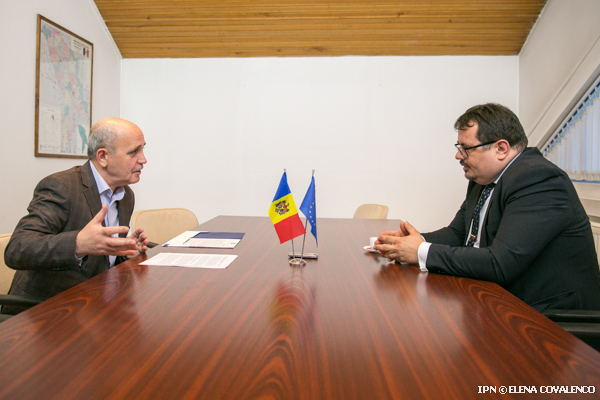
Civil society is more appreciated in Brussels and the EU than in Moldova
- What tendencies marked the relationship between the European institutions and civil society organizations of Moldova in 2107, in particular those that can promote and assess the implementation of the provisions of the Association Agreement? Do they feel the tensions in the relations between a part of these and the government in Brussels? How far can things go?
- For us, civil society is an important dialogue partner equal to the other partners as is, for example, the government or the political forces as it is a part of society that is active and wants to change things to the better in a particular sector, in a concrete community or in society in general. This is a value and a treasure for each country and each society. Fortunately, the Republic of Moldova possesses this active element and civil society in the Republic of Moldova is very respected by us, as is its expertise. We always encouraged and will encourage an intense dialogue between the state bodies and civil society, between the political forces and civil society, at all levels: regional, central, local. Only this way can the people’s will be reflected.
Those who are in power should see the relationship with civil society as a good opportunity for obtaining information about the thoughts and wishes of people. I think this is an advantageous relationship for both of the sides and we will continue to promote this type of cooperation. In our projects, in our programs we will definitely engage civil society, including in monitoring activities, because we appreciate a lot the independent opinions about the reform implementation process. The opinions of experts who, as I said, are highly respected in the Republic of Moldova, are very important for us.
- The pro-EU options of Moldovans in 2017 increased to a certain extent amid a significant decrease the last few years. Where do the growth and the decrease come from?
- I think we are now at the phase of closer rapprochement between the European Union and the Republic of Moldova. The Moldovans simply know better and more now about the European Union. The European reality becomes more known here. It sometimes becomes the reality for Moldovans too, by the implemented reforms or by information about the activities or assistance of the European Union. I think it is also about recognition of the fact that our values and our goals in the process of association of the Republic of Moldova, for improving people’s lives and introducing the European standards, is what the people want for their life, for their families and children, for their prospects in this country. And I think this is a proof of the bigger confidence in oneself, that it is possible to reach this wanted level of the quality of life.
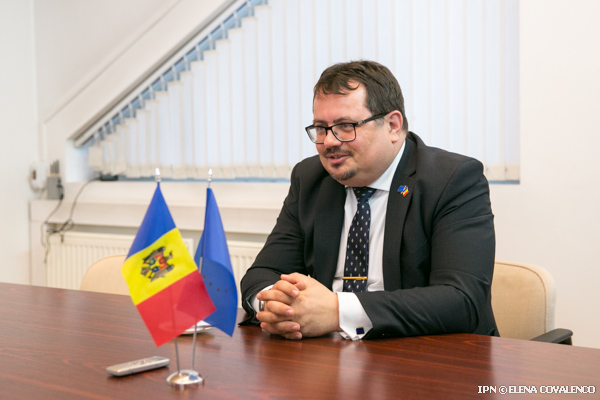
Mass media should be free and the EU’s position should be firm
- How useful do you think were the provisions of the Association Agreement for the Moldovan mass media in 2017? What influence can the law that bans Russian propaganda adopted last yearend with the official justification of protecting the European audiovisual values, produced including in EU member states, have on the activity of the mass media and on society in general?
- The mass media should be free in expressing the opinion and independent and should be able to inform the country’s people in an unbiased way. Without this no society can be called democratic and the existence of free media is one of the main criteria for any assessment of the given society. For its part, this freedom can be ensured by the existence of an appropriate legal framework and practical conditions for activity, including unhampered access to the advertising market so as to enable the media to survive economically. The journalists should not be afraid to do this when they generally inform not only about positive facts, exercising thus control in relation to the state institutions at national, regional or local level. The power of democratic transparency and information resides in this. This is ultimately the power of the informed people. In this regard, the European Union will continue to be a partner of the mass media in the Republic of Moldova, but we will also be active in devoting attention to the legal framework and working conditions for the mass media.
The struggle against misinformation is a very important one and indeed such a provocation exists not only in the Republic of Moldova, but also in many countries, including European. We always said that placing a general ban on access to sources of information is not a European practice. There are other, not only more precise, but also more efficient measures based on monitoring and concrete actions, when unacceptable deviations are witnessed. This is our approach and we hope the Republic of Moldova will borrow it in the future, in accordance with the European standards, and such a hope was also expressed by the OSCE representative on freedom of the media.
- In the course of 2017, several very influential pan-European parties in the EU leveled harsh criticism, even with harsh recommendations for the Republic of Moldova. At the same time, the executive bodies of the EU, which mainly consist of representatives of the given parties, reacted much more moderately. How do you explain this paradox, so to say?
- I already reminded of the common position of the European institutions as regards the adoption of the mixed electoral system, for example. So, I would say that here, even on the contrary, we see a determined and unified position of institutions, which was later confirmed in the Memorandum of understanding. If we speak about the macro-financial assistance in general, it already represents not only the EU’s position, but also the commitment on the part of the Republic of Moldova because this memorandum was signed by both of the sides. In this regard, I would repeat that the intensity of the stated positions, the attention devoted to the Republic of Moldova also show how close the Republic of Moldova is now to the European Union and how big the EU’s interest is in Moldova’s progress, in preventing particular negative phenomena and in ensuring results in the association and reformation processes.
- As a conclusion: What did the citizen of the Republic of Moldova gain from the country’s relationship with the EU in 2017? Did he also lose something? What other colors are there in the Moldova – EU relationship except for white and black for the Moldovan citizen?
- I think a part of the answers can be found in our whole discussion, but what is essential is that we are in the process of increasing the benefits that the citizens of the Republic of Moldova enjoy from the relationship with the European Union. We hope this will be a reality in all the areas. Any change brought about by reforms makes people’s life easier, makes the state be a better servant of the citizens, brings an additional euro into the pockets of salary earners in the Republic of Moldova, creates jobs and there were created thousands of jobs last year. Any project that brings drinking water or communal infrastructure to the citizens counts and there were thousands of Moldovans who benefitted from such projects last year and the previous years. All these are and will continue to be a powerful argument for continuing the cooperation and partnership between us, the European Union and the Republic of Moldova.













